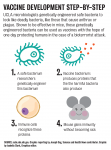UCLA microbiologists have developed vaccines against anthrax and other diseases likely to be used in bioterrorist attacks.
In a study published May 3, UCLA researchers developed a platform for creating vaccines against three Tier 1 select agents, bacteria responsible for diseases such as anthrax, tularemia and plague. Tier 1 select agents are effective in bioterrorism because they spread easily and are very deadly, according to the Centers for Disease Control and Prevention.
There is a need for vaccines against Tier 1 select agents because antibiotic treatments against these diseases are only effective for a couple days after exposure, and antibiotics may become ineffective as bacteria become resistant to them, according to the study.
The current vaccine for anthrax causes severe side effects and requires many shots, making it complicated to administer, said Marcus Horwitz, senior author of the study and a distinguished professor of medicine.
“Generally, the anthrax vaccine is given five times, with annual booster (shots) as well,” he said.
Qingmei Jia, an associate researcher in the Horwitz lab at UCLA and the lead author on the study, said the researchers started creating a more effective vaccine against anthrax by engineering a strain of bacteria to be safe to humans.
The researchers then genetically engineered the safe bacteria to produce proteins normally produced by the anthrax bacteria. Vaccinating mice with these anthrax-like bacteria trained their immune systems to recognize the bacteria that cause anthrax.
The results showed that mice vaccinated with anthrax-like, safe bacteria were more resistant to anthrax than mice given the existing anthrax vaccine. About 70 percent of the mice given the new vaccine survived, compared to 40 percent of the mice given the existing vaccine and 10 percent of the mice given no vaccine at all, according to the study.
“(The current anthrax vaccine) was surprisingly weak,” Horwitz said. “Ours is much better.”
To confirm that the vaccine properly activated the immune system, the researchers took blood samples from vaccinated mice. The immune systems of vaccinated mice showed signs of increased activity, producing more antibodies and signaling molecules than those of mice given the existing vaccine or no vaccine, said Barbara Jane Dillon, a staff research associate and author on the study.
“Surprisingly, (the mice) had high antibody titers against (anthrax),” Jia said. “(The mice) generated very good antibodies.”
The researchers also found the vaccine activated the cells of the immune system to remember the disease, which is important for long-lasting immunity to anthrax bacteria, Horwitz said.
The researchers are currently working to show their vaccine is also effective in primates, which is the next step toward getting approval from the U.S. Food and Drug Administration to test their vaccine on humans, Jia said.
If the vaccine is approved for use in humans, it would be relatively inexpensive to produce and easy to administer, according to the study. Making new vaccines may be straightforward because each vaccine is derived from the same strain of safe bacteria, Jia said.
Horwitz said that in addition to anthrax, the researchers have made vaccines against three other Tier 1 select agents, including the bacteria that cause plague and tularemia.
Jia said she hopes they can continue to develop vaccines for more Tier 1 select agents.
“We’ve expanded this (platform) for other Tier 1 agents and we’ve been very successful,” Jia said. “It’s very exciting.”
